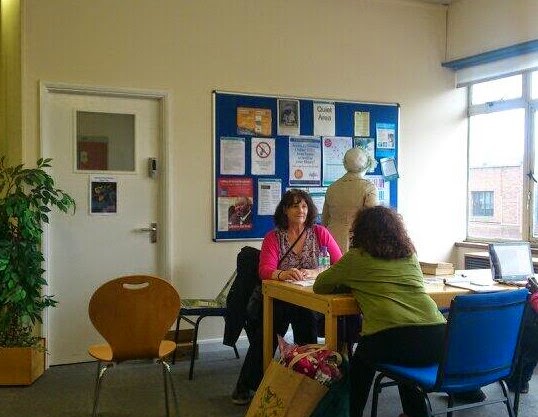 |
| Rosie, Mike, Carol, Linda, Liz, Andrea, Emily, Lindsay and Mark. |
Coming back in to the room, it looked marvellous. I remembered back when Rosie Canning and I held the first Greenacre Writers Mini Lit Fest two years ago saying to each other wouldn't it be wonderful to hold the lit fest in the home of Inky Stephens - Finchley's famous manufacturer of the ink that so many of us used in our schooldays. And two years on, here we were!
Soon our speakers had all arrived and the room was filling up and we were off. Rosie introduced our first speaker, Caitlin Davies. Her book The Ghost of Lily Painter was of great interest to the Finchleyites in the audience as it uncovers the story of two real women living in East Finchley who were baby farmers and were hanged in Holloway Prison in 1903. Caitlin told us how she got the idea to write this story and about some of her research.
I was pleased to welcome Alex Wheatle back to Finchley. He has supported the previous festivals, speaking at the first and appearing on the panel last year. Alex focused on his novel, Island Songs, set mostly in Jamaica. As well as visiting Jamaica himself, he based much of the book on stories his mother told him about growing up there.
 |
| Me at FLF ( photo: Donald Lyven) |
Rosie Fiore, an author living in nearby Mill Hill, was the first speaker for the second part of the afternoon, telling us a little about her writing and reading from her book Wonder Women. We particularly appreciated the extract as it was set in Finchley!
Guest reader A.L.Michael then read an extract of her novel followed by readings from Greenacre Writers: Linda Louisa Dell, Katie Alford and Anna Meryt.
Allen Ashley then joined us to facilitate the panel discussion. Our three main speakers were joined by Miriam Halahmy discussing the concept of men writing women and women writing men. This opened in to a more general discussion about how writers were perceived.
 |
| Rosie Fiore, Caitlin Davies, Allen Ashley, Miriam Halahmy, & Alex Wheatle. (photo: Rosie Canning) |
The discussion was opened up to questions and comments from members of the audience and I think it could have gone on for another hour but 6.00pm was approaching so Allen brought the discussion to an end. While Rosie C. thanked our panel, I presented each with a small token of our appreciation along with the same to Robert and Elisabeth Newton and Mike Gee. Many people had contributed to the Finchley Literary Festival but we knew that if we thanked each person who had helped it to be the success it was, we'd be there for a considerable time, which might not have endeared us the staff who had to prepare the room for a wedding the next day.
It had been a hectic but fantastic week and I'm very proud to have been one of the people behind the Finchley Literary Festival.
.jpg)
